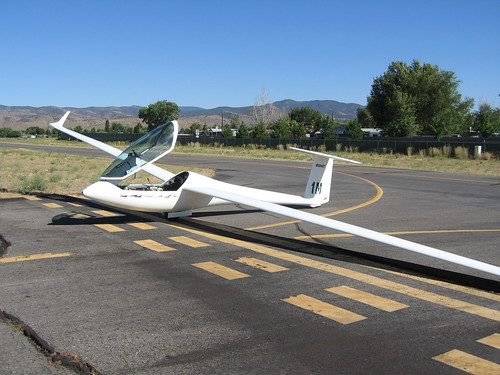I haven't flown my glider much in the last year and probably won't be flying it again for many months. While that may not be ideal, it means I can spend less money by not paying for an annual inspection and can greatly reduce or eliminate the insurance costs. Or so I thought.
It just so happens that my insurance carrier emailed the other day to ask about renewing my policy (it's that time of year). I explained that I probably wouldn't be flying it and would probably let the policy lapse. The countered with an offer of "storage only" or "ground" coverage, which means that they'd still insure it for non-flight related damage.
Now gliders are kind of expensive to insure in the first place. The annual insurance bill is roughly the same as it is for our Cessna 182Q (which is worth twice as much as my glider). So I was looking forward to paying a lot less.
Wrong!
It turns out that moving to storage only coverage still costs roughly 67% (2/3rds) of what the full flight coverage is. I'm still trying to process that figure. That's like State Farm Insurance telling me that if I agree to keep my car in the garage for a year, they'll give me a 33% discount.
Apparently, (1) there is a lot of overhead in the insurance industry, and (2) they think I'm far more likely to encounter non-flying damage.
And, the best part is this... If I were to cancel coverage all together for the year, I'd have higher rates when I come back next year because of discounts I've accrued with them. "If you let this policy go and then come back later, the new policy offered will be about 15% higher in cost just due to the loss of those discounts." Strangely, I thought those discounts were the result of earning additional ratings (like my Commercial) and gaining experience and flight time.
It's no surprise that the first four letters of the insurance company most glider pilots use are "Cost", huh?
Posted by jzawodn at March 19, 2009 10:08 AM | edit
I would guess that they fraud related claims might be higher on storage-only insurance which is why you don't get much of a break for keeping it on the ground.
Actually, many claims are not 'in motion' claims, but happen while trailering or parked. I've had two claims, one from landing short in a barley field, the second from a cracked canopy on the ground, on two different gliders. The prior owner of my current glider had it parked in his driveway, which was off a 90-degree turn and the first night he had it home a teenage girl went straight on that corner and hit the back of the trailer, which additionally damaged the rudder. Here in Colorado, odds are at least 1 in 5 that person wouldn't have insurance. If you cancel your flying cover, you are also probably canceling your renter/non-owner protection (up to your hull limits), but perhaps that's also covered by your power insurance. Nevertheless, your hull portion is the bigger chunk.
Back in the late 1970's, glider insurance in several markets was it's own insurance pool. My first glider was in a syndicate with three others in the UK. In those days, there was a £50 discount per pilot for having an FAI Silver C. That amounted to $400US in those days with all four pilots. After the Tenerife 747s collision and the DC-10 crash in Paris, gliders and general aviation were pooled with commercial carrier coverage and such discounts disappeared and glider insurance took a hike in price.
Same pool, different rules.
Frank
Colorado
Wow. I always wanted to learn how to fly gliders and that type of flying experience....
Wow! I like that plane... But I don't wanna ride that kinda thing..
> Apparently, (1) there is a lot of overhead in the insurance industry
I suspect they feel confident that you will not go anywhere else because of all the "discounts" you've got with them and so they're happy to milk you as much as possible.
Have you checked if a competitor would be willing to offer you a better price both for this term (grounded) and the next (flying)?
If you take only their offer as the basis to make your decision you're clearly playing into their hands. I've found it's often worth picking up the phone, talk to a few competitors, extract a better offer, then go back to your current insurer and see if they are willing to match/improve on that.
You could always sell the thing... or write another book for me to buy. Either one would save / cover the expense. ;)
One of those options is far more appealing than the other.

